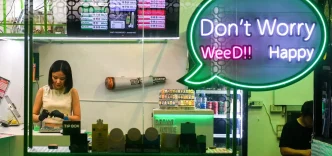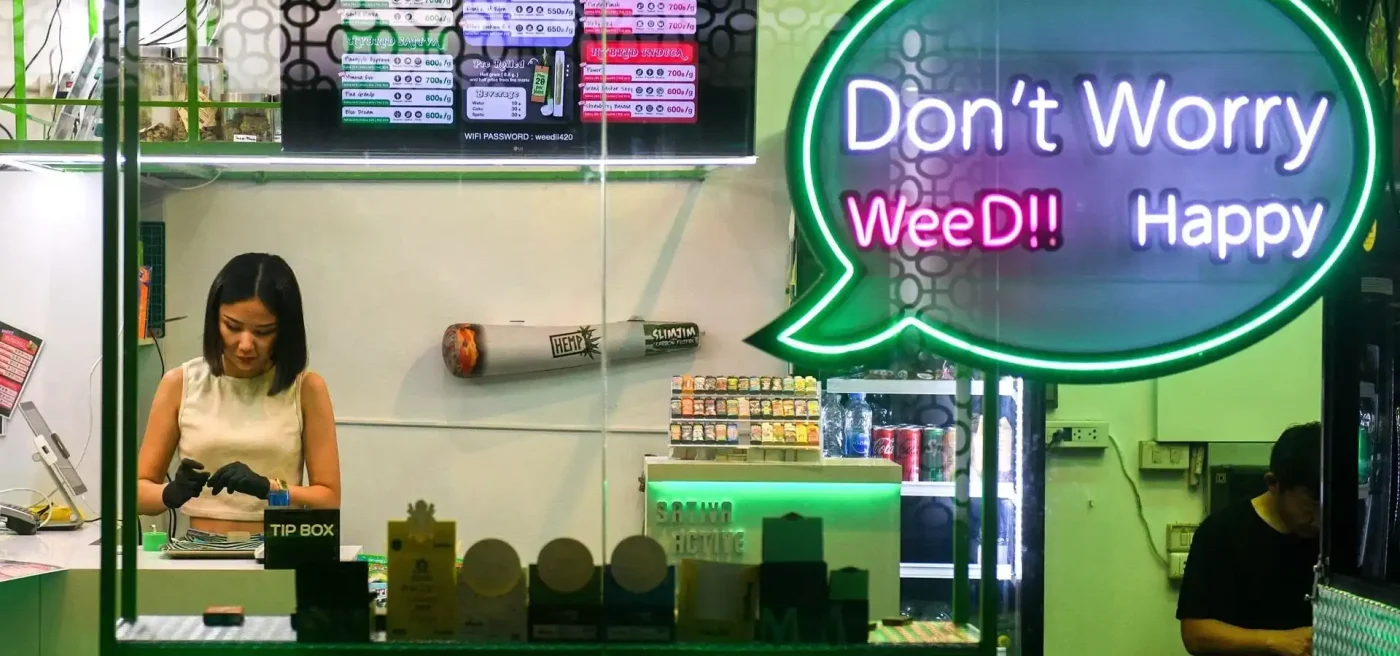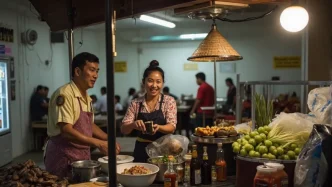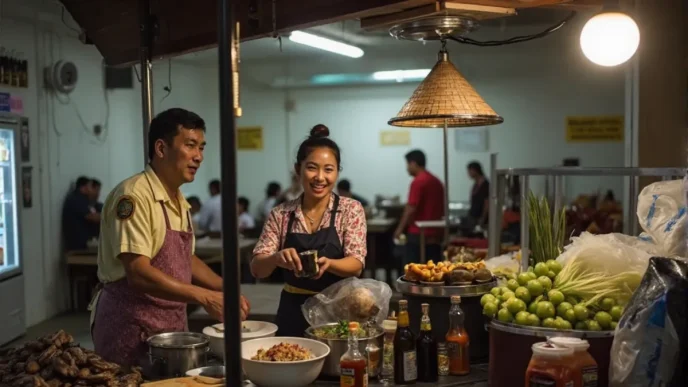Thailand is ramping up efforts to control the use and export of cannabis following its landmark removal from the narcotics list in 2022, as authorities grapple with illegal smuggling operations targeting international markets. Public Health Minister Somsak Thepsuthin announced stringent new measures, including a requirement for medical certificates to access cannabis legally, during a press conference in Bangkok on Wednesday. The move comes as officials report significant seizures at major airports like Don Mueang and Suvarnabhumi, highlighting the challenges of regulating a substance now classified as a controlled herb.
Crackdown on Illegal Exports
At the heart of the government’s renewed focus is the issue of cannabis smuggling. Minister Somsak revealed that authorities have intercepted substantial quantities of the substance being trafficked to countries including the UK, India, Pakistan, and Hong Kong. “Cannabis has been illicitly exported from Thailand, affecting multiple nations. Significant seizures have been made, including 73 kilograms from three cases at Suvarnabhumi Airport” said Somsak. He emphasized that exporting cannabis without proper authorization is a serious offense, carrying penalties of imprisonment and fines.
To combat this, a joint committee chaired by the Ministry of Public Health’s Permanent Secretary has been established, bringing together representatives from Customs, the Agriculture Department, the Immigration Bureau, and Airports of Thailand (AOT). Pawina Chariyathitipong, Acting Director of AOT, confirmed their commitment to enforcement, noting that hundreds of kilograms of cannabis have already been seized during initial crackdowns at airports. She also highlighted plans to introduce new detection technologies, such as K9 units, to address the limitations of current X-ray systems.
The smuggling routes, primarily involving India and the UK, have raised concerns about Thailand becoming a hub for illegal cannabis trade. Ras Chaleechan, Vice Minister for Foreign Affairs, underscored the government’s coordination with international organizations and diplomatic missions to clarify legal penalties and prevent scams that falsely claim cannabis can be exported legally. This international dimension adds complexity to Thailand’s efforts to balance its progressive cannabis policy with global drug control expectations.
New Restrictions on Domestic Use
Domestically, the Ministry of Public Health is moving to tighten access to cannabis. Within the next 40 days, a ministerial announcement will mandate that all users—both Thai nationals and foreigners—obtain a medical certificate to purchase or use cannabis legally. “We warn those attempting to export cannabis illegally without permits that they face imprisonment. Enforcement will now be strictly intensified” said Somsak. The certificate requirement aims to limit recreational use and ensure that cannabis is accessed only for approved medical conditions such as epilepsy, chronic pain, headaches, and insomnia.
Dr. Somruk Jeungsaman, Director-General of the Department of Thai Traditional Medicine, elaborated that future sales will be closely monitored, with usage limits potentially imposed. Legal action could follow for misuse beyond prescribed amounts. This shift marks a significant departure from the relatively lax enforcement perceived by the public since cannabis was decriminalized as part of a legal reform consolidating 30 laws into a single drug code. Now classified as a controlled herb—akin to a mild narcotic—the government believes that regulation through herbal law will be quicker and more effective than the lengthy process of amending broader drug legislation, which could take up to two years.
Public opinion on these changes remains divided. The Department of Thai Traditional Medicine is currently collecting feedback, with some citizens advocating for stricter controls to prevent abuse, while others support broader access for recreational purposes. This polarization reflects the broader cultural and social debate surrounding cannabis in Thailand, a country with a historically stringent approach to drug policy now navigating uncharted territory with liberalization.
Policy Evolution and Challenges
Thailand’s decision to remove cannabis from its narcotics list in 2022 was hailed as a progressive step, aligning with global trends toward decriminalization and medical use. The reform was part of a broader effort to streamline drug laws, consolidating numerous regulations into a unified code. However, the reclassification as a controlled herb has not eliminated regulatory challenges. Public misunderstandings about enforcement have persisted, with some assuming that decriminalization equated to unrestricted access. The recent announcements signal a clear intent to correct this perception and reassert control over both use and distribution.
The government’s strategy also reflects a pragmatic acknowledgment of enforcement limitations. While cannabis was initially delisted to promote medical and economic opportunities—such as cultivation for export under strict licensing—the rise in smuggling has exposed gaps in oversight. The joint committee’s formation and the push for advanced detection at airports indicate a multi-agency approach to address these vulnerabilities. Yet, the effectiveness of these measures remains to be seen, particularly given the sophisticated methods employed by smugglers and the high demand for cannabis in international markets.
Economic and Social Implications
Beyond enforcement, the tightening of cannabis regulations carries significant economic and social implications. Thailand had positioned itself as a potential leader in the global cannabis market, with licensed cultivation and export seen as a boost to agricultural communities and the national economy. Legal exports, when properly authorized, could generate substantial revenue, with local cultivators benefiting from international demand. However, the crackdown on smuggling risks tarnishing this potential by associating Thai cannabis with illicit trade, potentially deterring legitimate investors or partners.
Socially, the requirement for medical certificates may limit access for those who have come to rely on cannabis for personal or cultural use, particularly in rural areas where traditional medicine practices are prevalent. The move could also strain healthcare resources, as individuals seeking certificates will need to navigate medical systems that may not be fully prepared for the influx. Additionally, the focus on medical use raises questions about equity—whether poorer citizens will face barriers to obtaining certification compared to wealthier or urban counterparts.
Public health considerations are also at play. While the government aims to curb recreational use to prevent potential abuse, critics argue that overly restrictive policies could drive the market underground, fueling black-market trade and undermining the original intent of decriminalization. Balancing these competing priorities—public safety, economic opportunity, and individual freedom—will be a defining challenge for policymakers in the months ahead.
Regional and Global Context
Thailand’s evolving cannabis policy does not exist in isolation. Across Southeast Asia, drug laws remain notoriously strict, with countries like Singapore and Malaysia imposing harsh penalties for possession and trafficking. Thailand’s liberalization stands out as an exception, positioning it as a regional test case for decriminalization. However, the smuggling issue risks straining diplomatic relations, particularly with nations affected by the illegal trade. Collaborative efforts with international partners, as emphasized by Vice Minister Ras Chaleechan, will be crucial to maintaining Thailand’s credibility on the global stage.
Globally, the trend toward cannabis legalization—seen in places like Canada, Uruguay, and several US states—offers both inspiration and cautionary tales for Thailand. While legalization has brought economic benefits and reduced incarceration rates in some jurisdictions, it has also led to challenges with regulation, youth access, and impaired driving. Thailand’s insistence on medical certification and strict export controls suggests a cautious approach, learning from these international experiences while tailoring policies to its unique cultural and political context.
Looking Ahead
As Thailand rolls out its new cannabis regulations, the coming months will test the government’s ability to enforce compliance while addressing public concerns. The requirement for medical certificates, set to take effect within 40 days, will likely reshape access to the substance, potentially reducing recreational use but also sparking debate over fairness and practicality. Meanwhile, the crackdown on smuggling at airports like Don Mueang and Suvarnabhumi will serve as a litmus test for the joint committee’s effectiveness in curbing illegal exports.
For now, the message from Bangkok is clear: cannabis may no longer be a narcotic, but it is far from unregulated. As authorities intensify their efforts, the balance between liberalization and control remains delicate, with implications for Thailand’s economy, society, and international standing. How these policies unfold could set a precedent not just for cannabis, but for broader drug reform in a region long defined by punitive approaches.
















